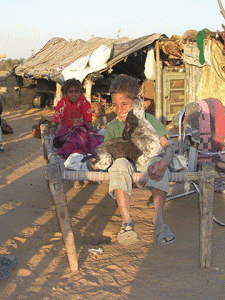Human dog bite injuries are a major public health problem, particularly where there are large populations of free-roaming or street dogs. In countries with endemic rabies, the bites of animals are the main means of transmission of this disease and dogs are accountable for 91.5 per cent of all bite wounds in India. Bites by dogs were also responsible for 96.2 per cent of human rabies cases in India. But despite the public health importance of dog bites, there has been little research into the causes or means of prevention.
In India, control of free-roaming dog populations has been attempted using animal birth control (ABC) programmes. Jack Reece and co-authors have previously reported that the ABC approach has been successful in controlling both the street dog population and rabies. The objective of their current study, recently published in Veterinary Record, was to determine if a relationship exists between the reproductive behaviour of dogs and human dog bites.1 Reece and his co-workers at Help in Suffering, Jaipur, had noted that the dispersal of pups of street dog litters from the dam occurred between 90 and 120 days after whelping. Anecdotal evidence from animal control personnel in the city indicated that bitches would often try to protect their two-to-three-month-old pups by biting personnel.
Canine reproduction has been found to be seasonal in Jaipur, with peak whelping activity in November. Humans being bitten by animals, as reported by the main government hospital in Jaipur, showed a seasonal trend with peaks in January and June; approximately 10 weeks after the seasonal peak of street dog breeding.
The authors found that, following the start of an ABC programme in 1996, the percentage total of the female dog population that had been spayed, rose quickly and has remained at between 70 and 80 per cent since 2003. They also observed that the number of human animal bite cases has declined since then, despite a rapidly expanding human population.

They conclude that, whereas sterilisation could not have led to an immediate halt in the growth of the dog population, the rapid increase in the percentage of spayed females may have prevented the further increase in bite frequency, if dog bites are indeed primarily due to bitches trying to protect their puppies.
They add that the results of their study suggests that, in addition to the benefits of rabies control, ABC programmes may have an effect on the numbers of human animal bite cases that far exceed the effects of reducing the dog population to the same level by indiscriminate culling.
Jack Reece explained, ‘The ABC programme at Help in Suffering (HIS) was set up to gather data about the effects of such programmes. HIS is an animal welfare charity, not a veterinary research institute, which is why my colleagues and I not only sterilise and vaccinate large numbers of street dogs (3199 sterilisations last year; 81 in the last week), but also monitor the effects and record data on many aspects of the work, including the street dog population and biology. Animal welfare is clearly a driving force for veterinary surgeons and animal welfare charities such as HIS, but it is unlikely to influence political leaders or bureaucrats. It’s for this reason that the HIS team have tried, where possible, to show human health benefits to ABC work; by publishing such benefits in peer-reviewed international veterinary journals, we hope that these decision makers may change their policies from ineffective culling and removal to more effective humane dog population control. As ordinary practicing veterinary surgeons, rather than academic researchers, it is pleasing to be able to suggest that our veterinary work has a direct and measurable affect on the health and the safety of the public – an example perhaps of the currently fashionable ‘One Health’ concept.’